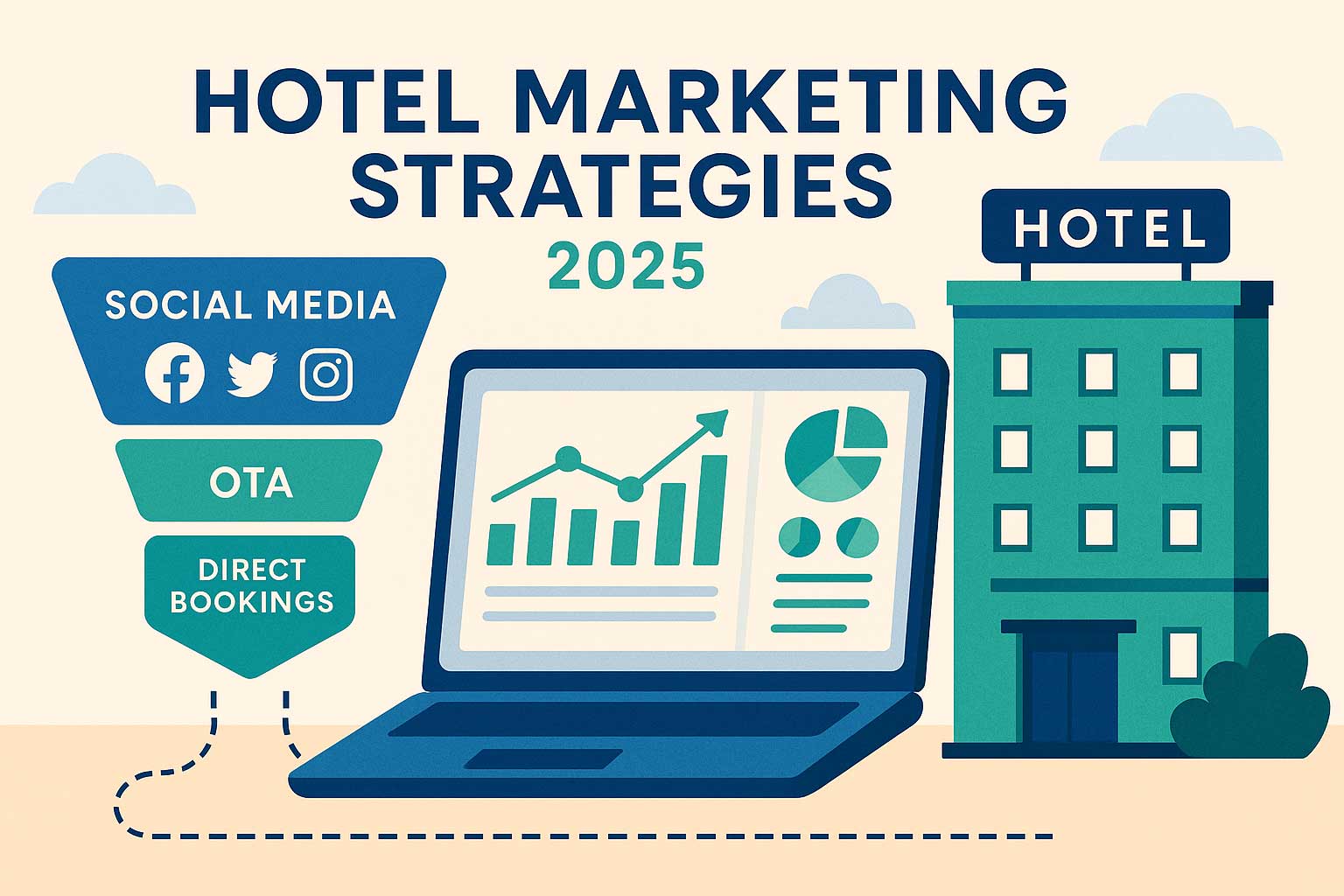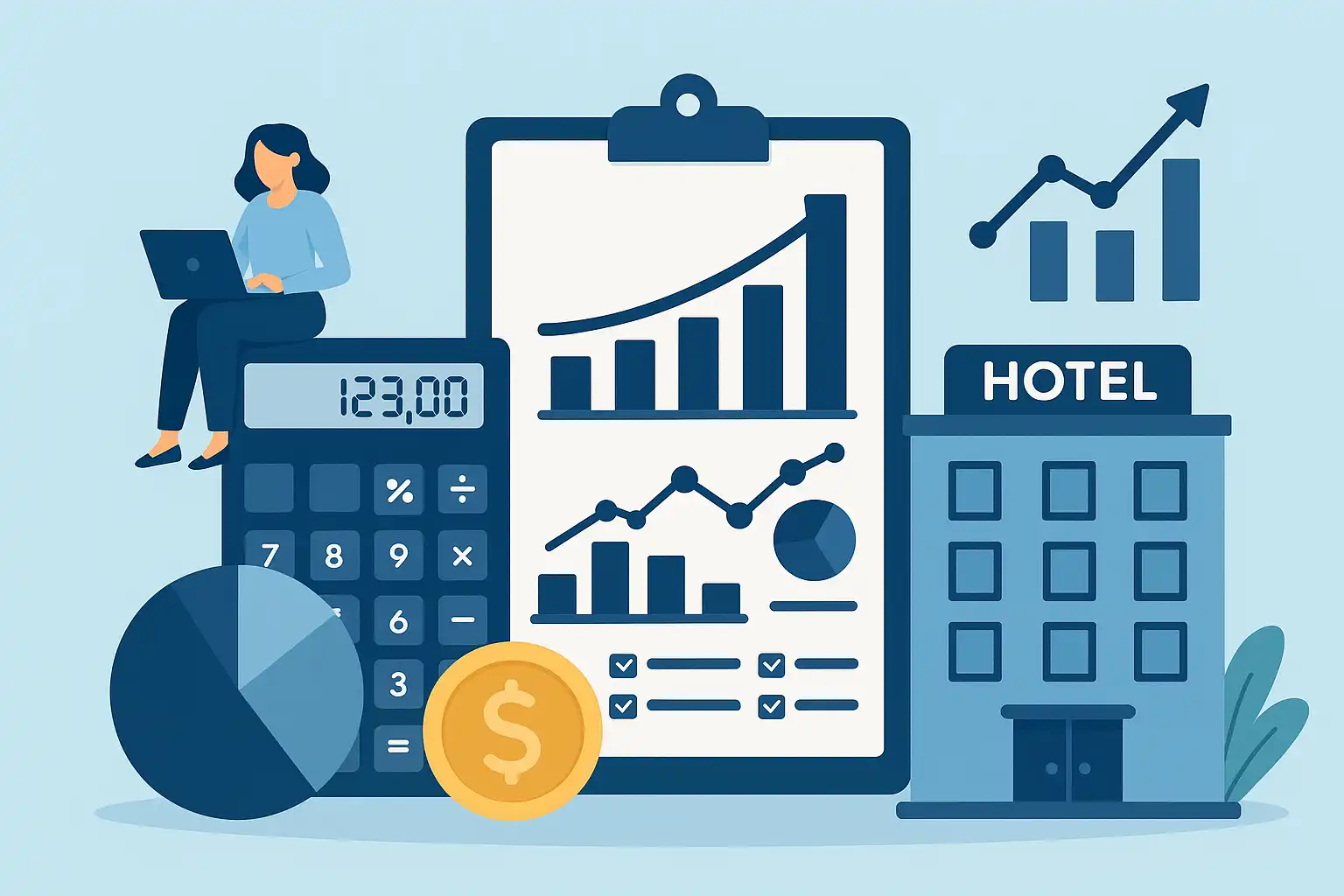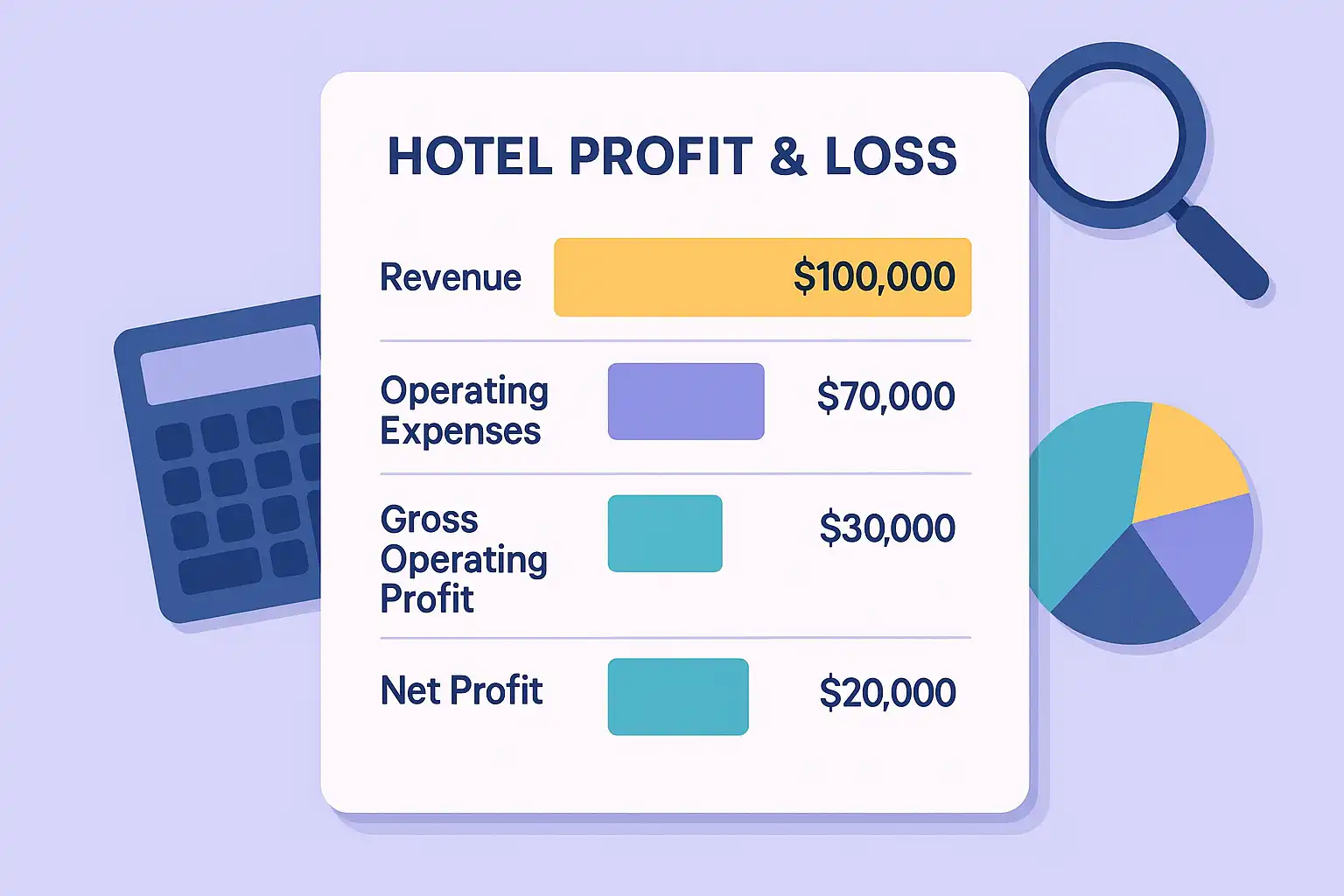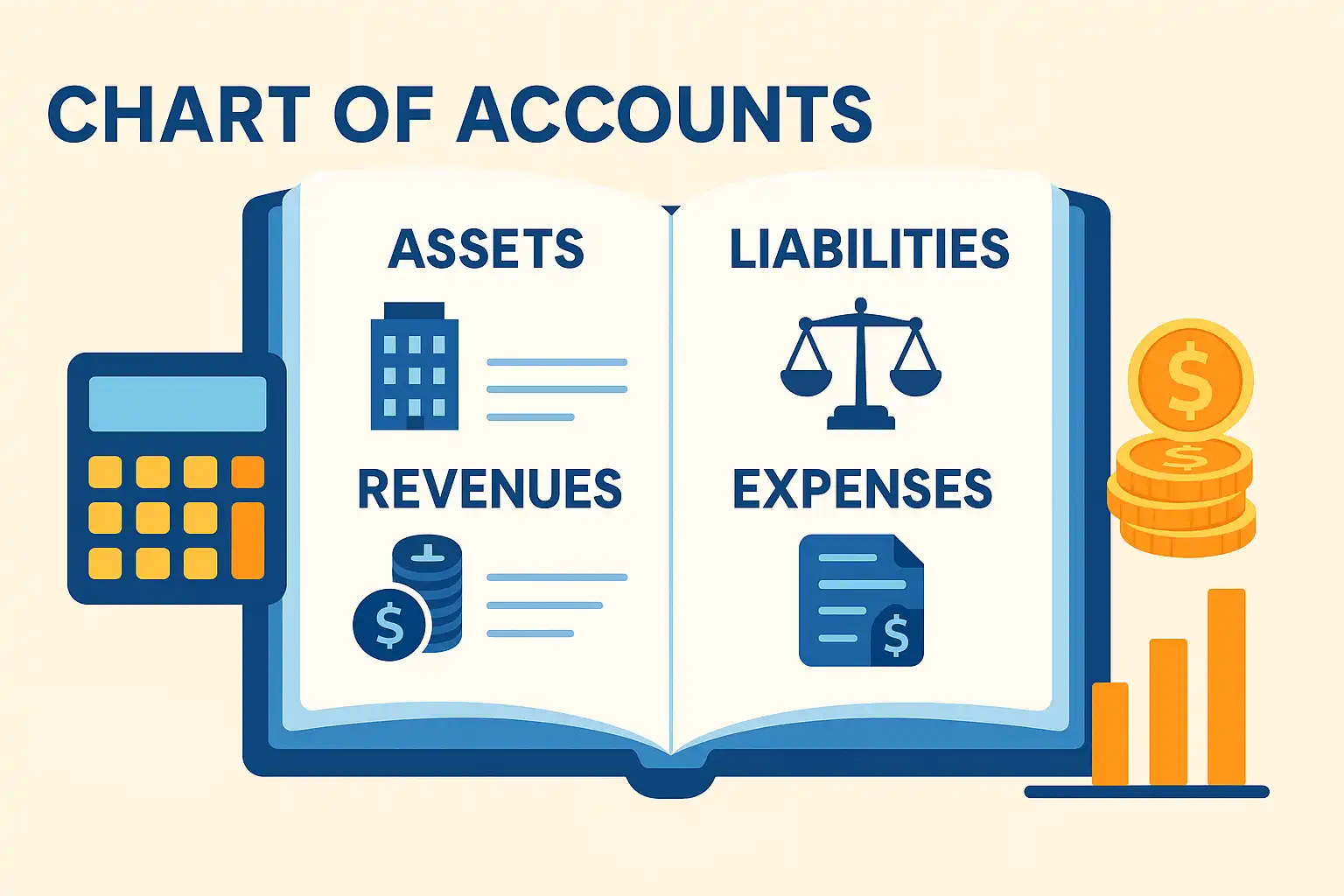Hotel Accounting: Financial Management for Hotels
Sep 28, 2025
 Mika Takahashi
Mika TakahashiPopular Categories
Hotel Technology & InnovationHotel Operations OptimizationDigital MarketingIndustry TrendsRevenue ManagementHospitality Industry
Popular Categories
Trending Post

Hotel Walk Letter Template: Professional Guest Communication

Online Travel Agents: What They Are and How They Work

Hotel Security Systems: Modern Protection Solutions

Hotel Advertising: Complete Guide to Boost Bookings and Revenue

25 Hotel Marketing Strategy Ideas for 2025: Complete Guide

AI Reservation Agent: Revolutionizing Hotel Booking and Guest Experience

PMS Communication: Streamlining Property Management Through Effective Guest Messaging
Table of contents
Running a hotel is no small feat. The hospitality industry never sleeps, juggling a whirlwind of revenue streams—from room bookings and food and beverage sales to spa treatments and a variety of other services. Unlike many businesses that close up shop at the end of the day, hotels operate 24/7, generating a constant flow of financial transactions. This nonstop activity brings unique challenges that standard accounting just can’t handle.
Hotel accounting is a specialized field that goes way beyond simple bookkeeping. It involves managing the complex financial operations needed to keep track of everything—from room revenue and occupancy rates to labor costs and operational efficiency. Whether you’re running a cozy boutique inn or managing multiple locations for a big hotel chain, grasping the ins and outs of hospitality accounting is essential for staying profitable and making smart business decisions.
In this all-encompassing guide, we’ll walk you through every key aspect of accounting in hotel operations. You’ll learn how hotel accounting software works hand-in-hand with property management systems, how to read and use key performance indicators unique to the lodging industry, and what regulatory requirements you need to keep an eye on to safeguard your hotel’s financial health.

What is Hotel Accounting?
At its core, hotel accounting is the specialized practice of recording, analyzing, and reporting financial transactions tailored specifically to hospitality businesses. Unlike general business accounting, it has to accommodate the unique quirks of hotels—like round-the-clock operations, multiple revenue streams, and wildly fluctuating demand.
But hotel accounting isn’t just about ticking boxes for compliance with generally accepted accounting principles. It’s the backbone of strategic decision-making, helping hotel managers fine-tune pricing strategies, rein in operational costs, and squeeze the most revenue out of every room and service.
How Hotel Accounting Differs from General Business Accounting
Hotel accounting stands apart in a few important ways. First off, hotels never close. This means daily financial closing procedures are a must, handled by night auditors who reconcile guest accounts and prepare revenue reports. This demand for real-time financial tracking is something most other industries don’t have to worry about.
Second, hotels juggle multiple revenue streams all at once. A single guest’s stay might include charges for the room, meals, spa treatments, parking, and room service. Each of these income sources needs its own tracking and analysis to understand how each department is performing and how the hotel is doing overall.
Another big difference is pricing. Hotels use dynamic pricing, meaning room rates constantly shift based on demand, season, and market trends. This makes accounting a bit trickier, requiring integrated revenue management systems that work closely with accounting software to keep tabs on average daily rates and revenue per available room.
Why Hotel Accounting Matters for Financial Management
Good hotel accounting is the lifeblood of smart management decisions. Hotel managers depend on daily financial reports to adjust staffing, tweak room rates, and allocate resources effectively. Without accurate, up-to-the-minute financial info, it’s nearly impossible to react swiftly to market changes or improve operational efficiency.
Since profit margins in hospitality tend to be tight—often just 25-35% for gross operating profit—every dollar counts. Hotel accounting systems need to capture and categorize transactions precisely to spot profit opportunities and areas where costs can be cut.
And let’s not forget compliance. Hotels have to keep track of all sorts of taxes, from occupancy to sales taxes on food and beverage, plus resort fees in some cases. Franchised hotels also need to provide detailed financial reports that meet brand company standards, making accounting even more complex.
Where Hotel Accounting Fits Across the Industry
Whether you’re running a small boutique hotel with 50 rooms or overseeing a giant chain like Marriott with thousands of properties, hotel accounting principles apply. Smaller hotels might use simpler systems focusing on core revenue and expenses, while big chains rely on sophisticated software that can handle multiple properties and automated reporting.
What really sets hotel accounting apart is how tightly it integrates with operational systems. Property management systems automatically post room charges, and point-of-sale systems in restaurants and bars feed transaction data directly into accounting software. This seamless integration helps keep financial records accurate and reduces manual errors.
Unique Challenges in Hotel Accounting
Managing finances in a hotel isn’t like handling them in any other business. The complexity of hotel operations creates accounting challenges that demand constant attention and specialized financial controls.
Keeping Up with Continuous Operations
Since hotels never close, their financial management needs to be just as nonstop. The night auditor plays a vital role, acting as both front desk staff and accounting pro, reconciling daily transactions, balancing guest accounts, and preparing financial summaries for management.
Financial transactions happen around the clock—from late-night room service to early morning conference bookings. Hotel accounting systems have to process these in real-time, often across multiple time zones for hotels with global footprints.
The daily financial closing, usually done between midnight and 6 AM, involves reconciling all revenue sources—room charges, food and beverage sales, spa services, and more. Night auditors make sure guest folios are accurate, credit card batches processed, and cash deposits documented before the new day begins.
Managing Dynamic Pricing
Hotels don’t have fixed prices. Room rates change constantly based on demand, seasonality, competition, and special events. This dynamic pricing means the same room might sell for very different rates on consecutive nights.
Revenue management systems adjust prices multiple times a day, so accounting software has to keep up, tracking not only the revenue but how well pricing strategies are working through metrics like revenue per available room and average daily rate trends.
Seasonal price swings also affect financial planning and cash flow. For example, a resort might charge three times more in summer than winter, creating big revenue fluctuations that require careful forecasting.
Tracking Multiple Revenue Streams
A full-service hotel pulls income from many places beyond just room sales. Food and beverage often makes up 20-30% of revenue, covering restaurant sales, banquets, room service, and bar operations.
Ancillary services add even more streams: spa treatments, gym access, business center usage, laundry, parking fees—all needing separate accounting to analyze departmental profitability accurately.
Conference and meeting facilities bring their own complexities, with contracts, advance deposits, and detailed billing for services like AV equipment and catering that must be accounted for properly.
Handling Complex Payroll
Hotel payroll is tricky because of the diverse workforce—full-time, part-time, seasonal, and on-call staff across many departments, each with different pay and benefits. Food and beverage staff who earn tips require careful handling to comply with wage laws and tip reporting.
Labor costs usually eat up 40-50% of operating expenses in full-service hotels, so tracking labor costs accurately is key to profitability. Labor cost percentages must include wages, benefits, payroll taxes, and insurance.
Seasonal staffing adds another layer, especially at resorts that might double their workforce in peak season. Accounting systems need to handle these fluctuations and provide budget variance analysis.
Managing Vendor Contracts
Hotels work with dozens of vendors—from linen and food suppliers to tech support and maintenance. Keeping track of contracts, payment schedules, and vendor performance is crucial to managing operational costs and quality.
Food and beverage vendors often have volume discounts, seasonal pricing, and quality guarantees that must be tracked in the accounting system.
Technology vendors provide essential services like PMS, internet, phone, and security, with recurring charges and upgrade fees that need budgeting and tracking.
Staying Compliant
Hotels face a maze of regulations that vary by location and property type. Occupancy taxes (bed or city taxes) must be collected and remitted, often with changing rules for business vs. leisure travelers.
Health department rules affect food operations, requiring documentation of safety procedures and employee training. Violations can lead to fines or closures.
Liquor licenses add another layer, with renewals and compliance that directly impact bar and restaurant revenue.

Essential Hotel Financial Statements
Hotel financial statements follow standard accounting rules but adapt to the unique needs of hospitality. They provide insights into departmental performance, operational efficiency, and overall financial health, helping managers make informed decisions.
Understanding how hotels tailor traditional financial statements is vital for anyone involved in hotel financial management. The Uniform System of Accounts for the Lodging Industry (USALI) provides standard formats that make benchmarking and comparisons easier.
Hotel Income Statement (Profit & Loss)
Hotel income statements break down revenue and expenses by department, letting management see how each area is performing and spot opportunities for improvement.
Revenue usually starts with rooms income—room sales, resort fees, and related charges. Food and beverage revenue covers restaurants, banquets, room service, and bars. Other income might come from spa, parking, business centers, and telecom.
Expenses mirror revenue categories, with direct costs allocated to each department. Rooms expenses include housekeeping supplies and front office payroll; food and beverage costs cover food purchases and restaurant payroll. This helps calculate profit margins and control costs.
Operating expenses split into controllable (utilities, marketing, maintenance) and non-controllable (property taxes, insurance, franchise fees).
The statement ends with gross operating profit—total revenue minus operating expenses before fixed charges like debt service. This key metric allows comparisons across different ownership structures.
Hotel Balance Sheet
Hotel balance sheets show the capital-heavy nature of the business, with big investments in buildings, furniture, fixtures, and equipment. These require ongoing maintenance and replacement, impacting cash flow and capital planning.
Current assets include cash, accounts receivable, and inventory, plus unique items like advance deposits and prepaid expenses. Guest ledger accounts track amounts owed by guests who have checked out but not yet paid.
Fixed assets dominate, including land, buildings, furniture, fixtures, and equipment. Hotels typically budget 3-5% of revenue annually for furniture, fixtures, and equipment (FF&E) replacement and renovations.
Intangible assets might include franchise rights and management contracts, which carry value but also obligations affecting profitability.
Liabilities include deferred revenue from advance deposits and accounts payable to suppliers and contractors.
Cash Flow Statement
Cash flow statements highlight the seasonal ups and downs of hospitality. Operating cash flows show daily transaction volumes, with room revenue being steady and food and beverage generating more transactions but smaller amounts.
Seasonal swings affect cash flow, especially at resorts where peak seasons generate most of the annual cash. Business hotels have steadier cash flow but may slow during holidays or downturns.
Investing activities often show cash outflows for maintenance and upgrades, usually timed to minimize guest disruption but challenging cash flow.
Financing activities reflect debt payments and fees paid to management companies or franchisors, impacting available cash.
Critical Hotel Accounting Metrics and KPIs
Hotels rely on specialized metrics and key performance indicators (KPIs) that reveal operational efficiency and financial health unique to hospitality. These help benchmark performance and identify ways to boost revenue and control costs.
Knowing these metrics inside and out is essential for hotel management, as they offer early warnings and guide strategic moves. Unlike other industries that focus mainly on profit margins, hotels balance multiple indicators reflecting occupancy, pricing, and efficiency.
Revenue Management Metrics
Average Daily Rate (ADR) shows the average price earned per occupied room, excluding taxes and fees. It’s a key gauge of pricing success, factoring in seasonality, room type, and market conditions.
Comparing ADR to competitors helps understand if your pricing is on point or needs tweaking.
Occupancy rate measures the percentage of rooms sold. While high occupancy is good, it must be balanced with ADR to avoid sacrificing revenue for volume.
Seasonal occupancy data helps with staffing, maintenance, and cash flow planning.
Revenue per Available Room (RevPAR) combines occupancy and ADR, giving a fuller picture of room revenue performance.
Tracking RevPAR growth shows market trends and competitive standing.
Total Revenue per Available Room (TRevPAR) includes all revenue sources, not just rooms, providing a comprehensive view of property performance.
TRevPAR helps spot opportunities for ancillary revenue growth and cross-selling.
Operational Efficiency Metrics
Gross Operating Profit per Available Room (GOPPAR) measures profitability per room, factoring in both revenue and expenses, regardless of occupancy swings.
GOPPAR trends reveal how well costs are controlled and revenue optimized.
Food cost percentage tracks food expenses against food and beverage revenue, with targets around 28-32%. It helps spot waste, theft, or pricing issues.
Labor cost percentage shows labor expenses as a share of total revenue, usually 40-50%. It helps balance staffing costs with service quality.
EBITDA focuses on operational performance by excluding interest, taxes, depreciation, and amortization, highlighting cash-generating ability.
Comparing EBITDA to industry benchmarks helps gauge operational efficiency.

Hotel Chart of Accounts and USALI Standards
The Uniform System of Accounts for the Lodging Industry (USALI) sets the standard framework for hotel accounting, ensuring consistent reporting and meaningful comparisons.
USALI’s 12th edition updates reflect modern hospitality trends, including new revenue sources and sustainability efforts.
How USALI Works
USALI organizes revenue and expenses by department—rooms, food and beverage, spa, parking, and more—allowing detailed analysis of each area’s profitability.
Expenses are split between direct departmental costs and undistributed operating expenses supporting the whole property.
Revenue and expense accounts have codes that help track and analyze financial data precisely.
Why Benchmarking Matters
Using USALI standards, hotels can benchmark performance against similar properties by size, location, and service level.
Benchmarking highlights strengths and weaknesses, guiding pricing, marketing, and operational strategies.
Brands and management companies use USALI for consistent reporting and to identify best practices across portfolios.
Lenders and investors rely on USALI-compliant reports for clear financial insights.
Key Hotel Accounting Roles and Responsibilities
Hotel accounting involves specialized roles that blend traditional accounting know-how with hospitality’s unique operational needs. The size and structure of accounting teams vary by property, but certain core roles are found everywhere.
Understanding these roles and how they work together is key to smooth financial management and operational control.
Front Office and Night Audit
Night auditors are the vital link between daily operations and financial reporting. Working overnight, they reconcile guest accounts, post charges, and prepare daily financial reports.
They ensure all guest folios are accurate, point-of-sale charges are correctly posted, and cash and credit card transactions are balanced.
Front desk cashiers support these efforts during the day by managing guest payments and maintaining cash controls.
Back Office Accounting Positions
Hotel accountants handle day-to-day financial operations, including accounts payable, general ledger maintenance, payroll, and monthly reporting per USALI.
Accounts payable clerks focus on vendor invoices, ensuring proper approvals and coding to control costs.
Financial controllers oversee the accounting function, prepare budgets, analyze variances, and coordinate with owners and auditors.
Vendor relationships are managed carefully to optimize payments and procurement.
Revenue Manager Collaboration
Revenue managers work closely with accounting to record room revenue accurately and optimize pricing strategies.
They analyze daily revenue metrics and coordinate pricing changes to maximize profitability.
Tracking future revenue from group bookings and contracts is another key collaboration area.
Hotel Accounting Software and Technology
Modern hotels rely on sophisticated software that integrates property management, point-of-sale, and accounting to provide real-time financial data and automate transactions.
Choosing the right hotel accounting software is critical for operational efficiency, accuracy, and insightful management reporting.
Integration Essentials
Property management systems (PMS) handle reservations and billing, feeding data automatically to accounting software.
Point-of-sale systems post charges from restaurants, bars, and other outlets directly to guest accounts.
Credit card processing integrates to reconcile payments and speed cash management.
Night audit automation improves accuracy and speeds daily financial closing.
Software Features to Look For
Multi-property consolidation lets hotel groups manage finances across locations.
Real-time reporting gives managers instant access to key financial indicators.
Automated billing speeds invoicing and cash flow.
Budget variance tools highlight performance gaps.
Inventory integration helps control costs and measure profitability.
Popular Hotel Accounting Solutions
M3 offers hospitality-focused financial management with USALI compliance and multi-property support.
ALICE combines property management and financial tools in a cloud platform with mobile access.
Sage Intacct provides cloud financial management with strong reporting and scalability.
QuickBooks is sometimes used by smaller hotels but lacks hospitality-specific features.
Industry-specific solutions generally offer better integration and reporting, making them worth the investment.
Cloud vs. On-Premise
Cloud solutions provide automatic updates, remote access, and less IT overhead.
Data security and compliance are critical considerations with cloud providers.
Cloud’s scalability suits seasonal or growing hotels.
Reliable internet is a must for cloud-based systems.
On-premise offers more control and customization but requires more IT resources.
Best Practices for Hotel Accounting Management
Managing hotel accounting well means balancing financial control, reporting, and compliance with hospitality’s operational demands. Following best practices helps ensure accuracy, efficiency, and regulatory compliance, giving management reliable data for decision-making.
Strong Internal Controls
Separation of duties prevents fraud by ensuring no one person controls all parts of a transaction.
Cash handling, posting, and reconciliation should be divided among different staff.
Authorization limits and approval workflows keep spending in check.
Documentation supports audit trails and accountability.
Regular reconciliations catch errors early.
Detailed Audit Trails
Keep thorough records of every transaction, including guest registrations, receipts, and vendor invoices.
Control system access based on job roles and review regularly.
Track changes to accounting systems and procedures carefully.
Back up data securely and test recovery plans.
Daily Reconciliation Procedures
Reconcile cash drawers, credit card batches, guest accounts, and departmental revenues daily.
Verify bank deposits match revenue reports and are timely.
Regular Variance Analysis
Compare actual results to budgets and prior periods to spot issues.
Analyze departmental profits and key performance indicators.
Month-End Close Procedures
Record accruals properly to match revenue and expenses to the right period.
Update inventory valuations and depreciation monthly.
Review and approve journal entries.
Prepare financial statements per USALI standards on time.
Staff Training
Train staff on accounting procedures, cash handling, and systems.
Provide ongoing education on updates and changes.
Cross-train to cover absences and emergencies.
Compliance and Regulatory Considerations
Hotels face a complex web of regulations affecting financial management and operations. Staying compliant protects your business from penalties and helps maintain licenses and reputation.
Tax Reporting
Understand local and state sales tax rules for rooms, food, and services.
Collect and remit occupancy taxes properly.
Handle income and payroll taxes, including tip reporting.
Manage multi-jurisdiction tax complexities for international operations.
Labor Law Compliance
Track work hours, overtime, and minimum wage rules.
Ensure proper tip reporting and break periods.
Maintain records for equal employment opportunity compliance.
Manage benefits administration per regulations.
Financial Reporting
Franchises and management companies require detailed, standardized financial reports.
Lenders and investors expect regular statements and compliance certificates.
Publicly traded companies follow GAAP and disclosure rules.
Audit Preparation
Conduct regular internal audits to spot issues early.
Maintain organized documentation for external audits.
Have clear policies for audit responses and follow-ups.
Industry-Specific Regulations
Comply with health department rules for food safety.
Manage liquor licenses carefully.
Maintain fire safety and building code compliance.
Ensure ADA accessibility.
Follow environmental and data protection regulations.
Hotel accounting is much more than bookkeeping—it’s a specialized craft that requires a deep understanding of hospitality’s unique operational challenges, industry-specific metrics, and regulatory demands. From managing nonstop operations and dynamic pricing to applying USALI standards and ensuring compliance, effective hotel accounting lays the groundwork for profitable and strategic business management.
Technology has revolutionized hotel accounting, with integrated property management and accounting software delivering real-time financial insights that give hotels a competitive edge.
Success in hotel accounting demands attention to detail, adherence to best practices, and ongoing learning as technology and regulations evolve. Whether you’re managing a small boutique or a multi-property empire, strong accounting procedures and up-to-date industry knowledge directly impact your hotel’s financial health and long-term success.
With tight profit margins and complex operations, precise financial management is essential for sustainability. By following the best practices in this guide and focusing on accurate reporting, cost control, and performance analysis, hotel accounting professionals can play a pivotal role in driving their properties’ profitability in a competitive market.
